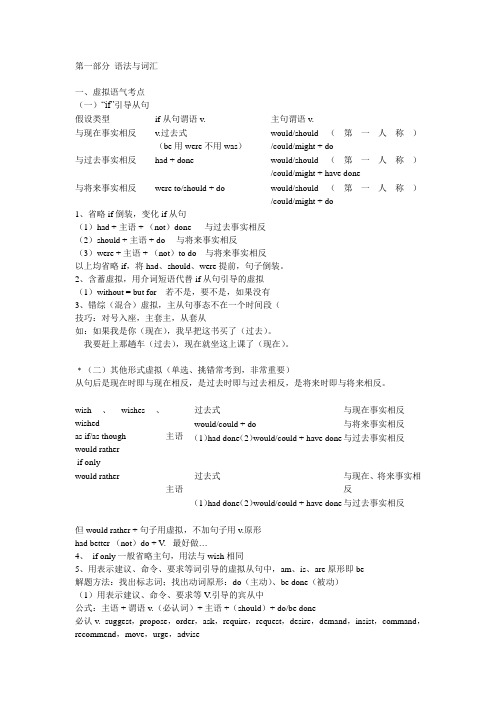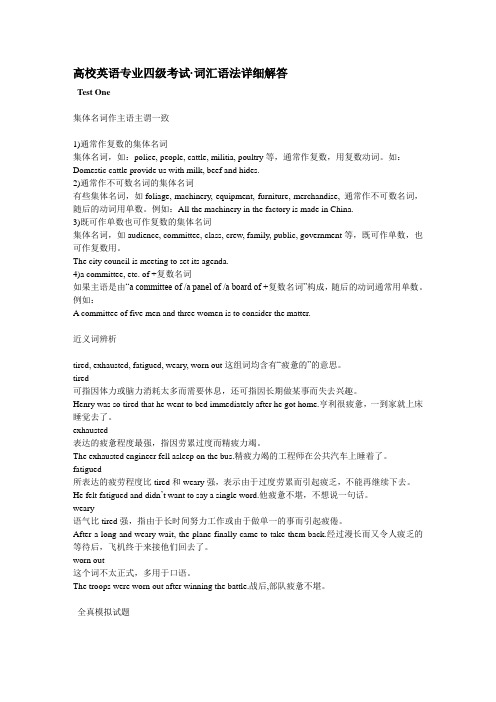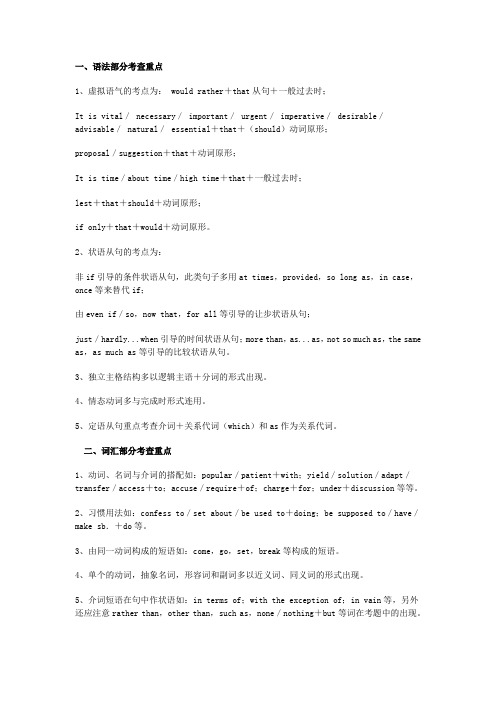完整版专四英语语法考点分析解析
专四语法

第一部分语法与词汇一、虚拟语气考点(一)“if”引导从句假设类型if从句谓语v. 主句谓语v.与现在事实相反v.过去式(be用were不用was)would/should(第一人称)/could/might + do与过去事实相反had + done would/should(第一人称)/could/might + have done与将来事实相反were to/should + do would/should(第一人称)/could/might + do1、省略if倒装,变化if从句(1)had + 主语 + (not)done 与过去事实相反(2)should + 主语 + do 与将来事实相反(3)were + 主语 + (not)to do 与将来事实相反以上均省略if,将had、should、were提前,句子倒装。
2、含蓄虚拟,用介词短语代替if从句引导的虚拟(1)without = but for 若不是,要不是,如果没有3、错综(混合)虚拟,主从句事态不在一个时间段(技巧:对号入座,主套主,从套从如:如果我是你(现在),我早把这书买了(过去)。
我要赶上那趟车(过去),现在就坐这上课了(现在)。
﹡(二)其他形式虚拟(单选、挑错常考到,非常重要)从句后是现在时即与现在相反,是过去时即与过去相反,是将来时即与将来相反。
wish、wishes、wishedas if/as though would rather if only 主语过去式与现在事实相反would/could + do 与将来事实相反(1)had done(2)would/could + have done 与过去事实相反would rather主语过去式与现在、将来事实相反(1)had done(2)would/could + have done 与过去事实相反但would rather + 句子用虚拟,不加句子用v.原形had better (not)do + V. 最好做…4、 if only 一般省略主句,用法与wish相同5、用表示建议、命令、要求等词引导的虚拟从句中,am、is、are原形即be解题方法:找出标志词;找出动词原形:do(主动)、be done(被动)(1)用表示建议、命令、要求等V.引导的宾从中公式:主语 + 谓语v.(必认词)+ 主语 +(should)+ do/be done必认v. suggest,propose,order,ask,require,request,desire,demand,insist,command,recommend,move,urge,advise(2)用于与建议、命令、要求等V.意义类似的形容词所引导的从句公式:It is + adj. (必认词)+ that + 主语 +(should)+ do/be done必认adj. suggested,proposed,ordered,asked,required,requested,desired(desirable),demanded,commanded,recommended,urgent,advisable,important,vital,essential,necessary, imperative(3)与表示建议、命令、要求等v.相类似的n.引导的表语从句和同位语从句表从公式:主语 + 系词 + that + 主语(should) + do/be done同位从公式:n. + that + 主语(should)+ do/be done必认n. suggestion,proposal,order,requirement,request,desire,demand,insistence,requirement,request,desire,demand,insistence,motion,recommendation,advice6、 It's/was/ + time + that + 主语 + did(过去式)早该到…的时间了/high time/about time7、跳层虚拟公式:真实,otherwise / or + 虚拟虚拟,but + 真实(一般考过去时)特点:真实——过去时或 must have done,对过去肯定猜测虚拟——would / could + have done(三)情态v. + have done ,表示对过去事情的推测must + have done 肯定,没有musn't(表禁止…)could + have done 本能够,可能做(但未做)may + have done 本可能,或许might + have done 本可能should = ought to + have done 本应做,而未做(含责备)shouldn't = oughtn't to + have done 本不应做而做了(含责备)needn't + have done 没有必要做而做了(无责备)need 情态v.“必要” + v.实义v.“需要” + need doing(形式主动,实际被动) = need to be done“需要”need + to do二、非谓语动词(一)不定式: to do / not to do1、形式(时态/语态), vt.(vi.只有主动)基本形式:主动被动﹡一般式to do to be done﹡完成式to have done to have been done进行式to be doing ×完成进行式to have been doing ×注意:不定式的一般式表示动作与主句的动作将要发生或同时发生,而不定式的完成式表示动作要先于主句的动作前发生,不定式的完成式不能作定语。
专四常考语法点汇总

语法与词汇专项语法核心考点一:从属分句复合句= 主句+从句(1个或1个以上)要点1从属分句是复合句必不可少的组成部分,以语法功能作为分类标准,从属分句可以分为状语从句、关系从句(即定语从句)和名词性从句。
其中状语从句可分为时间、地点、原因、结果、程度、目的、条件、让步和方式等;名词性从句可分为主语从句、宾语从句、表语从句、同位语从句。
要点2 状语从句的考点集中在方式、条件、让步、方式和时间状语从句上;关系从句的考点集中在关系代词的选择,限制性定语从句和非限制性定语从句的区别;名词性从句的考点集中在宾语从句和同位语从句。
一状语从句状语从句真题剖析:1 Nine is to three _____ three is to one. (2008, 53)A. whenB. thatC. whichD. what2 ______ he wanted to go out with his friends at the weekend, he had to stay behind to finish his assignment. (2008, 55)A. Much thoughB. Much asC. As muchD. Thouth much3 Men differ from animals ____ they can think and speak. (2008, 54)A. for whichB. for thatC. in thatD. in which4 They stood chatting together as easily and naturally as ____. (2008, 60)A. it could beB. could beC. it wasD. was5 The couple had no sooner got to the station ______ the coach left. (2009,60)A. whenB. asC. untilD. than6 ____ the boss says, it is unreasonable to ask me to work overtime without pay. (2010,55)A. WhateverB. WheneverC. WhicheverD. However7 Fool ____ Jerry is, he could not have done such a thing.A. whoB. asC. likeD. that8 He asked me to lend him some money, which I agreed to do, ___ that he paid me back the following week. (2005)A. on occasionB. on purposeC. on conditionD. only if9 Which of the following contains an adverbial clause of cause?A. I got a job as soon as I left university.B. As there was on answer, I wrote again.C. You must do the exercise as I show you.D. Wealthy as he is, Mark is not a happy man.状语从句重点总结:(一)条件状语从句:表示条件或假设,通常由以下连词或结构引导:★特别提醒几种不常用的条件状语从句举例:In the event that she can not arrive on time, we will go first.Suppose it snowed, we would still go.Say what he said were true, what would you do about it?(二)让步状语从句:含有“虽然,尽管,即使”之意,主要引导词有:★特别提醒1. 几种不常用的让步状语从句举例:In spite of the fact that he was deaf and dumb, he had a genius for music.While the grandparents love the children, they are strict with them.Much as she needed the job, she had to refuse.For all that there were a lot of difficulties, he finally entered the final competition and won.Granted you have made much progress, you should not be conceited.2. 用了although或though,就一定不能再后面的从句中同时用but,但是though可以和yet 连用。
英语专业四级考试语法精讲[1]
![英语专业四级考试语法精讲[1]](https://img.taocdn.com/s3/m/a66f1368561252d380eb6e8d.png)
英语专业四级考试—语法精讲虚拟语气第一部分:概述虚拟语气类型(宾语从句;状语从句;名词性从句(主语从句,同位语从句,表语从句);定语从句;特殊类型(感叹句);省略if 的虚拟法(倒装))ExamplesThe rapid change of society requires that college students adapt to the world outside campus by getting to know the society.I would rather that you did nothing for the time being.I wish that I were a student again.I wished that I had followed his suggestion.名词性从句中的虚拟主语从句(it is +adj./p.p that)同位语从句(The +n. that )表语从句(n. +be that)省略if 的虚拟法(倒装)(1)虚拟语气中如果从句引导词if / whether 省略,从句中需要倒装,提前助动词(系动词)或情态动词。
Eg. If it should rain tomorrow, we would not be able to have the sports meeting.=Should it rain tomorrow, we should not be able to have the sports meeting.省略if 的虚拟法(倒装)(2)Eg. Whether it (may) be fine or rainy, we would have the sports meeting. =Be it fine or rainy, we would have the sports meeting.If she had been given more information, she could have answered the questions.=Had she been given more information, she could have answered the questions.第二部分详解&总结虚拟语气的动词标志―insist, suggest, require, request, demand, propose, prefer, maintain, move,urge, recommend, command, order‖等动词表“建议、愿望”时,其后宾语从句中谓语动词要用虚拟语气。
高校英语专业四级考试_词汇语法详细解答

高校英语专业四级考试·词汇语法详细解答Test One集体名词作主语主谓一致1)通常作复数的集体名词集体名词,如:police, people, cattle, militia, poultry等,通常作复数,用复数动词。
如: Domestic cattle provide us with milk, beef and hides.2)通常作不可数名词的集体名词有些集体名词,如foliage, machinery, equipment, furniture, merchandise, 通常作不可数名词,随后的动词用单数。
例如:All the machinery in the factory is made in China.3)既可作单数也可作复数的集体名词集体名词,如audience, committee, class, crew, family, public, government等,既可作单数,也可作复数用。
The city council is meeting to set its agenda.4)a committee, etc. of +复数名词如果主语是由“a committee of /a panel of /a board of +复数名词”构成,随后的动词通常用单数。
例如:A committee of five men and three women is to consider the matter.近义词辨析tired, exhausted, fatigued, weary, worn out这组词均含有“疲惫的”的意思。
tired可指因体力或脑力消耗太多而需要休息,还可指因长期做某事而失去兴趣。
Henry was so tired that he went to bed immediately after he got home.亨利很疲惫,一到家就上床睡觉去了。
专四语法讲义

专四语法部分一、总体概况:语法考点:三大从句——名词、定从、状从非谓语动词时态、语态、语气、情态动词其他二、从句讲解三大从句(一)三大从句五种基本句式主语+谓语vt+宾语主语+谓语vt+宾语+宾语主语+谓语vt+宾语+补语主语+谓语vi+状语主语+系动词+表语状语,主语(定语)谓语宾语状语(定从) 系动词表语(状从)(同位语)(非谓语)(非谓语)(介词短语)(介词短语)(副词)长难句解题技巧:抓住干,定从句逗号原则:在英语句子中,逗号是不能连接两个独立完整的句子的。
名词性从句三大从句(二)两步解题法1.抓连词2.状从中的连接词——常考固搭so…that in order that such…that with the result that so thatthat引导名词性从句——that+完整句子(1)主语从句e.g. It is true that he passed the exam.It is said that he passed the exam.It is a pity that he didn’t pass the exam.强调句式It is/was+被强调部分+that+不完整句子主、宾、表、状e.g. I met him in the street.It was him that I met in the street.It was in the street that I met him.(2)宾语从句主+谓语vt+(that)+完整句子e.g. I know (that) he passed the exam.(3)表语从句主+系动词+that+完整句子e.g. My suggestion is that he go with us tomorrow.(4)同位语从句抽象名词+that+完整句子e.g. My suggestion that he go with us tomorrow.There is/are +抽象名词+that+完整句子Answer,belief,concept,conclusion,decision,discovery,doubt,evidence,sign,fact,hope,idea,informati on,knowledge,suggestion,thought,probability…On the condition that…Despite the fact that…On the understanding that…that 引导限定性定从all some any one(s) every each…the first the lastthe only the veryn+that+不完整句子作从句中的主、宾、表语e.g. The book that was written by him is pop.that引导同位语从句抽象名词+that+完整句子that 引导限定性定从n+that+不完整句子作从句中的主、宾、表语The fact that he passed the exam was true.The fact that he found was true.三大从句(三)What=all that; the thing that; the person thatWhat 只引导主从、宾从、表从,不能引导定从和同位从What+不完整句子What he said made me happy.e.g. _____it turned out,it was Italian movie.A What_____it turned out was Italian movie.A WhatI know what he said.I listen to what he said.This is what he said.词______+ 不完整句子n A what Xvt/介词/系动词 A what 可以考虑词,_______+不完整句子A whatB whichC thatwhat 与how 的区别I don’t know what to do.I don’t know how to do it.I’m thinking of ______to do about it.A.whatB. how介词短语在句子的位置1)作状语句子+介短/介短+句子2)作定语n+介短3)作表语系+介短wh—ever与no matter wh—区别让步、名从让步I don’t believe whatever he said.Whatever happens,don’t panic.公式however + adj/adv + 主语+ 谓语e.g. It caused them to think about _______they might control the experiences of children to duce responsible and productive adults.A. whatB. howC. whateverD. however if 与 whether 的区别 if_______about the university the mind, love, dreams, or ordering a drink. A) whatB) whether C) while D) if Never ask a child _______he likes or dislikes.A) what B) whether C) that D) which We know, however,________ no two places are exactly the same. A) Although B) whether C) since D) that 三大从句(四) 定语从句两步解题法1. 抓先行项(指人、物、整句话内容)2. 抓关系词在定语从句中的成分e.g. This is the house_______①I once lived.②I once visited.①where/in which②that/which/xThis is the very house_________ I once visited.e.g. I’ll never forget the day______①I met him.②I spent with him.①when/on which②that/which/xI’ll never forget the very day______ I spent with him. 地点n where 主+谓vt+宾/宾/宾补主+谓vi主+系+表时间n when 主+谓vt+宾/宾/宾补主+谓vi 主+系+表the reason why 主+谓vt+宾/宾/宾补 主+谓vi 主+系+表 三大从句(五)Which 在专四考试中,只考定语从句。
英语专四语法考点总结

一、语法部分考查重点1、虚拟语气的考点为: would rather+that从句+一般过去时;It is vital/ necessary/ important/ urgent/ imperative/ desirable/advisable/ natural/ essential+that+(should)动词原形;proposal/suggestion+that+动词原形;It is time/about time/high time+that+一般过去时;lest+that+should+动词原形;if only+that+would+动词原形。
2、状语从句的考点为:非if引导的条件状语从句,此类句子多用at times,provided,so long as,in case,once等来替代if;由even if/so,now that,for all等引导的让步状语从句;just/hardly...when引导的时间状语从句;more than,as...as,not so much as,the same as,as much as等引导的比较状语从句。
3、独立主格结构多以逻辑主语+分词的形式出现。
4、情态动词多与完成时形式连用。
5、定语从句重点考查介词+关系代词(which)和as作为关系代词。
二、词汇部分考查重点1、动词、名词与介词的搭配如:popular/patient+with;yield/solution/adapt/transfer/access+to;accuse/require+of;charge+for;under+discussion等等。
2、习惯用法如:confess to/set about/be used to+doing;be supposed to/have/make sb.+do等。
3、由同一动词构成的短语如:come,go,set,break等构成的短语。
CET4语法考点全解析

CET4语法考点全解析在准备英语四级考试的过程中,语法一直是考生们比较头疼的一个部分。
由于语法知识点众多,考试时往往容易混淆,因此,了解并掌握每个语法考点是非常重要的。
本文将对CET4考试中常见的语法考点进行全面解析,帮助考生在备考中有针对性地进行复习。
一、冠词冠词是英语中一种常见的虚词,包括定冠词“the”和不定冠词“a/an”。
定冠词“the”表示特指,常用于特定的人、事物或概念;不定冠词“a/an”表示泛指,常用于不特定的人、事物或概念。
在考试中,考生需要注意正确使用冠词,避免使用错误或遗漏。
二、时态英语时态是考试中的重要考点之一,主要包括一般现在时、一般过去时、一般将来时、现在进行时、过去进行时、过去将来时等。
考生需要根据句意和语境选择正确的时态,避免时态错误导致句子不通顺或不符合语法规则。
三、名词名词是英语中一种表示事物、人或概念的词汇,可分为可数名词和不可数名词。
在考试中,考生需要注意名词的单复数形式、所有格形式以及名词性从句的使用,避免在句子中出现名词错误。
四、动词动词是英语中一种表示行为或状态的词汇,主要包括一般动词、情态动词、动词的时态和语态等。
在考试中,考生需要注意动词的时态和语态的正确使用,避免主谓不一致或动词形式错误。
五、代词代词是英语中一种用来代替名词或其他词汇的词汇,包括人称代词、物主代词、反身代词等。
在考试中,考生需要注意代词的正确使用,避免在句子中出现代词错误或误解。
六、连接词连接词是英语中一种用来连接句子、短语或词汇的词汇,包括并列连词、从属连词和连接副词等。
在考试中,考生需要注意连接词的使用,保持句子逻辑性和通顺性。
七、介词介词是英语中一种用来表示位置、方向或关系的词汇,包括时间介词、地点介词和方式介词等。
在考试中,考生需要注意介词的正确使用,避免在句子中出现介词错误或误解。
总结:通过上述对CET4语法考点的全面解析,考生可以更好地理解和掌握英语语法知识,提高语法水平和应试能力。
专四语法归纳总结解读

一些搭配与主谓一致
• • • • • • • • a great many + 可数名词复数 many a + 可数名词单数 a number of +可数名词复数 the number of +可数名词复数 the majority of +可数名词复数 neither/either of +可数名词复数 more than one +可数名词单数 one and a half +可数名词复数 谓语用复数 谓语用单数 谓语用复数 谓语用单数 谓语用复数 谓语用单数 谓语用单数 谓语用单数
• 专四中常见的虚拟语气形式。 1) wish后的宾语从句 I wish I knew what was going to happen. 2)suggest (suggestion),propose(proposal),advise (advice)demand, insist, order, request, require, recommend, desire, ask, decide等。在这些从句中,谓语 形式为should加动词原形,should可以省略。 例:The general’s command was that the soldiers _____ their fort and carry out more important task. A. would leave B. leave C. left D. have left (答案:B)(2002年49题) 例:It’s desired that she _____ to teach us at least twice a week. A. comes B. will com C. come D. may come (答案:词作主语主谓一致 1)通常作复数的集体名词 集体名词,如:police, people,cattle,militia民兵,poultry家禽 等, 通常作复数,用复数动词。如: Domestic cattle provide us with milk, beef and hides. 2)通常作不可数名词的集体名词 有些集体名词,如foliage叶 子,machinery,equipment,furniture,merchandise,通常作不可数 名词,随后的动词用单数。例如: All the machinery in the factory is made in China. 3)既可作单数也可作复数的集体名词 集体名词,如audience, committee, class, crew, family, public, government等,既可作单数,也可作复数用。 The city council is meeting to set its agenda. 4)a committee,etc. of +复数名词 如果主语是由“a committee of /a panel of /a board of +复数 名词”构成,随后的动词通常用单数。例如: A committee of five men and three women is to consider the matter.
- 1、下载文档前请自行甄别文档内容的完整性,平台不提供额外的编辑、内容补充、找答案等附加服务。
- 2、"仅部分预览"的文档,不可在线预览部分如存在完整性等问题,可反馈申请退款(可完整预览的文档不适用该条件!)。
- 3、如文档侵犯您的权益,请联系客服反馈,我们会尽快为您处理(人工客服工作时间:9:00-18:30)。
语法考点之一:虚拟语气考点1.If从句中的虚拟语气1、与过去事实相反:从句sbhad done,主句sb would(should, could, might)+havedone;2、省略if,从句的语序用到装,即将were,had或should移至主语的前面,但否定词not不前移。
3、与将来事实相反:从句sb did (should+do或were+todo),主句sb would (should,could, might)+do。
4、错综条件句:主句与从句的动作发生在不同的时间段。
比如:从句对过去虚拟,而主句对现在虚拟,即从句sb had done,主句sb would(should, could, might)+do;考点2:表示建议、要求、命令等动词如insist,order,command, suggest, advise, propose, a sk,require, request,demand引导的从句及it引导的相应的分词、名词和形容词从句,谓语用(should)+动词原形。
考点3:Itis +advisable,essential, important, imperative,incredible等从句,谓语用(should)+动词原形。
考点4:it is(high/about)time that的结构中,从句使用一般过去式。
例如:考点5:much as"尽管,虽然"引导让步状语从句,从句中用would havedone表示假设。
考点6:if only, wish,as if/as though引导从句,与过去事实相反:had +done;与现在事实相反:动词过去式;与将来事实相反:could/would+do考点7:would rather/sooner从句中使用一般过去式或过去完成式分别表示对现在或过去的虚拟考点8:lest/ forfear that+(should) +原形动词。
语法考点之二:情态动词*情态动词: will(愿意),shall(将), must(必须), can, may,would, should(应该), might, could, ought to, used to(过去常常), need(需要), dare(竟敢),have to(不得不)考试中,情态动词部分重点测试以下内容:ﻫ(1)情态动词+行为动词完成式(表示推测)ﻫ(2)某些情态动词的特殊用法考点1. 情态动词+have+过去分词结构表示推测(1) must have done表示推测过去某事“一定”发生了。
否定形式为:can’t/couldn’thave v-ed,表示过去不可能发生某事。
(2) could have done表示推测过去某动作“很可能”发生了。
(3) may/ might have done表示推测过去某事“也许”发生了.(4) oughtto/ should have done 和oughtnotto/ shouldn’t have done 用于对已发生的情况表示“责备”、“不满”,分别表示“本应该…”和“本不应该…”(5) needn’t have done 表示过去做了某事,但没有做的必要, 意为“本没必要…”。
*did not need to do 动作并没发生。
考点2.特殊用法(1)should 表示惊讶1. I am surprised__ this city is a dullplace to livein.2006A. that you should thinkB.by what you are thinkingC. that you wouldthink D.with what you werethinking(2) Can’t but+ V.,表示不得不,与have to同义。
Can’thelp +Ving忍不住。
(3) cannot … too / enough表示“无论怎么……也不算过分”、“越……越好”(4)may/mightas well + 动词原形”意为“最好,满可以,倒不如”,相当于hadbetter(5)maywell + 动词原形”,意为“(完全)能,很可能”(6)mayas well as还是…好了语法考点之三:非谓语动词考点1:不定式(1) 考察哪些动词接不定式;(2) 考察哪些短语接不带to的不定式;Had better/had bestWouldrather/wouldrather … than/rather than/would sooner/would sooner…thanCannot but/cannot help but/do nothing but/donothing besides/do nothingthanWhy引导的疑问句(3)考察动词不定时的时态和语态:进行式tobe doing,完成式to have done;一般式被动语态tobedone;完成式被动语态to havebeen done。
另外,不定式短语有将来时的意思;考点2:动名词(1)常接动名词做宾语的词:mind(介意), miss(逃过), mention(提及), prevent, postpone, practice,risk(冒险), resist(抵制), consider(考虑), admit(承认),avoid(避免), appreciate(感激),fa ncy(幻想), finish(完成),feellike(喜欢),escape(逃脱),ensure(确保) , delay(延迟), deny(否认), resent,detest,imagine(想象), suggest(建议)(2)介词后的ing:prevent/stop/keep sb/sth from doing 阻止…做…spend/waste time /money in doing 在做…方面花钱、浪费时间或金钱;how/what about doingsth 做…怎么样了?Havesome difficulty/trouble in doing在…方面有些困难;There isnosense indoing (做…是没有理由的)Thank/admire /praise/blame /scold/ punishsb fordoing sth因做某事而感谢、羡慕、表扬、责备、惩罚某人(3)接动名词做介词to 的宾语:apply oneself to致力于;be accustomedto习惯于;confess to供认;cometo谈到;devote oneself to献身于;get down to着手做;give wayto 对…让步;lead to导致;lookforwardto期待;n ext to几乎;objectto反对;pay attention to注意;stick to坚持;stand up to勇敢面对;turnto求助于;beused to习惯于考点3:分词(1)从语态上看,现在分词一般表主动,过去分词一般表被动;(2)从时态上看,现在分词表示进行,过去分词表示过去。
如果分词动作发生在句子谓语动词动作之前,分词用完成时。
(3)现在分词的否定形式是not放在分词之前。
*非谓语动词解题三步曲:一、首先确定主句;二、分析主动被动;三、分析动作先后1._____ should not become aserious disadvantage inlife and work.2010A. To benot tallB.Not being tallC. Being not tall D.Not to be tall2."Theman preparing the documents is thefirm's lawyer" has allthefollowing possible meaningsEXCEPT. 2009A.the manwho has prepared the documents...B. the man whohas been preparingthe documents...C. the man whois preparing the documents...D.the man who will prepare the documents...3. ______ at in thisway, the situation doesnotseem sodesperate.2000 A.Looking B. lookedC.Beinglooked D.to look4.Ifnot ____ with the respecthe feels dueto him, Jackgets very ill-temperedandgrumblesall thetime.2004A.beingtreated B. treatedC. be treated D.having been treated5. ______,he cannow onlywatch it on TV at home. 1998A.Obtaining not a ticket forthematchB.Notobtaining a ticket for the matchC. Not having obtainedaticketfor the matchD. Not obtained a ticketforthematch6. He wasn’t askedtotake onthechairmanship of the society, ______insufficiently poplar with all members.1996A. having consideredB. wasconsideredC. was beingconsideredD. being considered7. He noticed the helicopterhovering over the field.Then tohis astonishment, hesaw a rope ladder______outand three menclimbing down it. 1995A.throwing B.beingthrown C. having thrown D.having bee nthrown8. This missile is designed so that once_____nothing can bedone to retrieve i t.1995A. firedB. being firedC. they firedD. having fired考点4:独立主格(句中没有连接词,逗号分开两个句子,存在两个主语。
